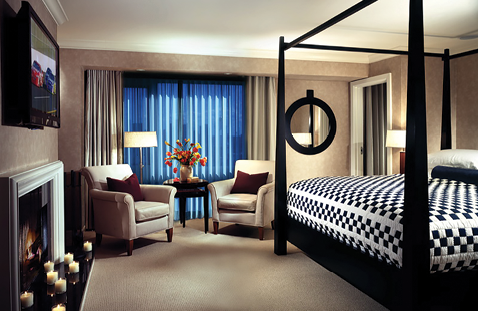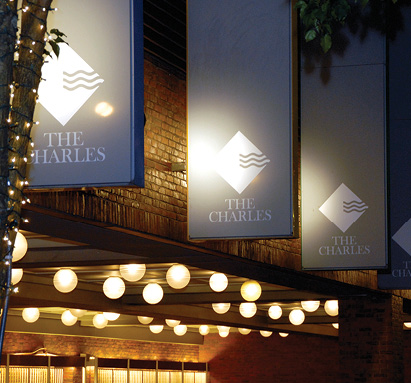- Home
- Media Kit
- Current Issue
- Past Issues
- Ad Specs-Submission
- Ad Print Settings
- Reprints (PDF)
- Photo Specifications (PDF)
- Contact Us

![]()
ONLINE

A Strong Independent
Editors’ Note
Prior to joining The Charles Hotel, Alex Attia was General Manager at The Jefferson in Washington, D.C. Previously, he served as General Manager at the Loews Hotel Vogue in Montreal, as well as Executive Assistant Manager at the Loews New York Hotel. Attia worked with Omni Hotels and Sheraton Hotels, as well as an independent property in Chicago, before joining Loews Hotels in 1993. A native of Tunisia, he was educated at the University of Villetaneuse in Paris and graduated with a bachelor’s degree in 1981. He is fluent in French and Arabic.
Property Brief
Next door to Harvard’s Kennedy School of Government and just steps away from the university’s storied quads, The Charles Hotel (charleshotel.com) opened for business in 1984 and, over the past 25 years, has welcomed everyone from Barbra Streisand to His Holiness the Dalai Lama. The Charles is a member of Preferred Hotels and Resorts and an AAA Four Diamond award-winning hotel. It boasts 295 guest rooms, 46 suites, and one presidential suite. With its classic New England design, sophisticated service, technology, and one-of-a-kind accommodations, The Charles Hotel is ideal for both business and leisure travel.
Is there opportunity for growth today in the Boston market?
Most definitely. Boston now has direct flights from almost every corner of the world. The biggest challenge will continue to be labor – finding good people who we train and who we hope will stay with us.
It’s not that complex but, in this business, it takes time to understand the ins and outs, and the younger generation doesn’t seem to have as much patience as in the past, which makes hiring a challenge.

The Charles Presidential Suite bedroom
How important is it to communicate the message about the opportunities available in this industry?
Most would listen and even agree but, outside of school, they are wired to say they are ready to take on every challenge because schools say they gave them all the information they need to succeed. But when they get into the real world and have to deal with people who are different from them, they need to adjust and adapt. They must also adjust to the market with new supply and demand, and new customer expectations, which takes time.
Some are very bright and so it shouldn’t take them 20 years to become a GM, but it will take awhile.
Are you looking at people out of hotel schools like Cornell or are hospitality skills learned at the property?
We want those with the right attitude or personality because, at day’s end, we communicate with people. We can’t teach that. People are either born with it or they’re not.
We look at those from hospitality schools because they have the foundation and understand the business of service. I’m looking for long-term relationships.

The Charles Presidential entrance signage
Will changes take place at the property going forward?
Our strength is our concept. The property has been evolving for 30 years. We continue to try to stay ahead of the game, be it from the level of WiFi and not charging for it or not charging for international phone calls, as well as what we offer in the room itself, from the space to the appointments to the comfort of the mattress.
After that, it’s about the offerings from the F&B concept. We have three great restaurants so the customer doesn’t feel stuck with the same meal each day.
In terms of what the future holds for The Charles, it’s an independent hotel that has been very successful. The success is because of the team and the ownership that we have. Our turnover has been under 20 percent for more than 10 years and we’re really proud of that in this market. That goes back to how we treat and care for our people.
Do you believe that independent properties can survive?
The Charles will survive because of the limitation around the neighborhood – there is no room for other projects.
However, The Charles and the ownership understand that reinvesting in the property is the key to its success. We spend a lot of money on the property.
How valuable is your suite product?
The mix of suite to regular room ratio is really high. This is due to some corporate business that we have. This business accounts for more than $5 million per year and most guests love our suites.
What makes your F&B mix work?
We’re really lucky to great chefs and concepts that work for not only the hotel but for the community, first and foremost. Our restaurants were put together for the community because we never think of them as an amenity; they are businesses that have to survive on their own. This had led to success for each of our restaurants over the years.
How diverse is your meeting space?
We have about 14,000 square feet of meeting space that does $10 million in revenue a year – it’s probably 60 percent corporate revenue and 40 percent social. We have a lot of parking options and we’re also near public transportation.
How international is your clientele?
The many direct flights from around the world have added a bit more to our substantial international consumer base. We are the best option in Cambridge so a new customer is going to look at us first and then go to Boston if we’re not available. The market has been very good for the past few years. When we’re running over 80 percent occupancy, we only have two days when we’re not full. The rates have also gone up over 8 percent as well.
How critical is it to have such invested owners?
As an operator, that is our dream – to have owners that want to know what is going on, on a monthly basis. We can then use their connections within the community to influence some of the outcomes.
How do you define what a true luxury hotel experience is today?
The luxury experience involves meeting customer expectations on their terms. We have to have a very good concept and very good rooms with enough space and have all the amenities that come with that.
The most important point is recognition. If a guest stays with us twice in a year and we don’t remember them, the third time we will have a problem.•